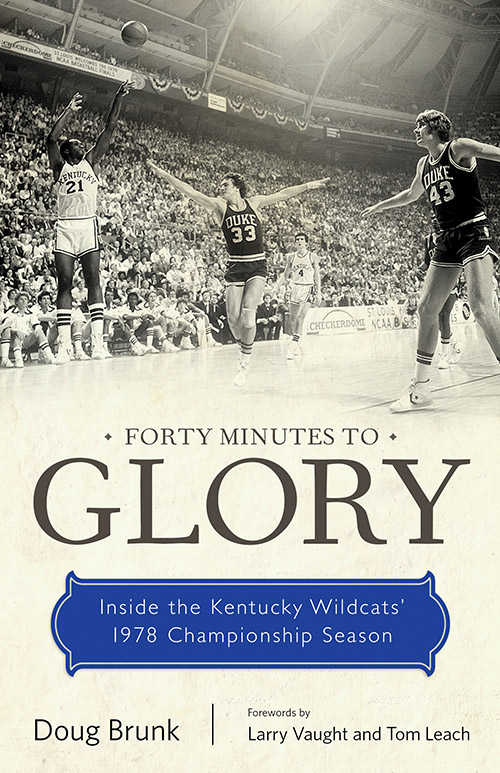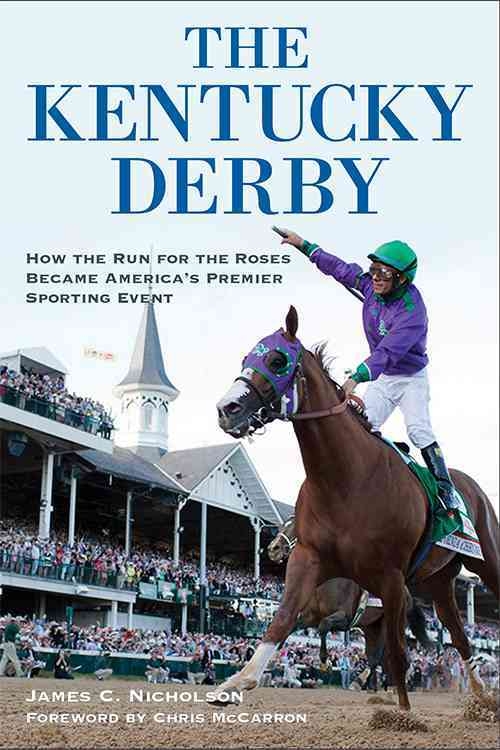Indie Groundbreaking Publisher
University Press of Kentucky Celebrating 75 Years
Will Governor Bevin Spoil the Party?
The University Press of Kentucky (UPK) is an award-winning and much-admired press widely known for its publishing excellence in the areas of Appalachian cultural history, military history, and the Civil War, along with more contemporary topics like horseracing and whiskey-making. UPK is the scholarly publisher for the Commonwealth of Kentucky, representing a consortium of Kentucky's state universities, five of its private colleges, and two historical societies -- and the press celebrates its 75th anniversary this year.
So, why would Kentucky Governor Matt Bevin want to spoil the celebration and shut the press down?
Sadly, as part of a sweeping budget-cutting measure, Governor Bevin has proposed that 70 small programs in the state budget be completely eliminated, along with across-the-board cuts to public higher education that would include the University Press of Kentucky budget. That budget? $672,000, which pays employee salaries -- all other expenses are covered through book sales. In contrast, the annual salary of Kentucky basketball coach John Calipari? $8 million.
Ironically, UPK has published several books on Kentucky basketball, including the upcoming spring 2018 release, Forty Minutes to Glory: Inside the Kentucky Wildcats’ 1978 Championship Season, and The Winning Tradition: A History of Kentucky Wildcat Basketball, by Bert Nelli and Steve Nelli.
The press has released many other books that "tell Kentucky’s story by Kentuckians," such as A New History of Kentucky, The Kentucky Encyclopedia, The Encyclopedia of Louisville, The Kentucky African American Encyclopedia, and The Atlas of Kentucky. In a state with a growing tourism economy, their catalog of books probably ranks as one of the state's best marketing tools.

Some highlights:
In Forty Minutes to Glory, Doug Brunk presents an inside account of this celebrated squad and their championship season from summer pick-up games to the net-cutting ceremony in St. Louis. Brunk interviewed every surviving player, coach, and student manager from the 1977–1978 team and he shares unbelievable tales, such as how James Lee’s father talked him out of quitting. Brunk also reveals heart-wrenching moments, recounting the time when Jay Shidler traveled 150 miles to visit his seriously ill mother on the eve of the national semifinals game against Arkansas and how Scott Courts coped with his father’s death just days before the championship game against Duke. Published to coincide with the fortieth anniversary of the national championship victory, Forty Minutes to Glory invites the Big Blue Nation to relive a special season.
 Each year on the first Saturday in May, the world turns its attention to the twin spires of Churchill Downs for the high-stakes excitement of the "greatest two minutes in sports," the Kentucky Derby. No American sporting event can claim the history, tradition, or pageantry that the Kentucky Derby holds. For more than 130 years, spectators have been fascinated by the magnificent horses that run the Louisville track. Thoroughbreds such as Secretariat and Barbaro have earned instant international fame, along with jockeys such as Isaac Murphy, Ron Turcotte, and Calvin Borel. The Kentucky Derby: How the Run for the Roses Became America's Premier Sporting Event calls this great tradition to post and illuminates its history and culture. James C. Nicholson argues that the Derby, at its essence, is a celebration of a place, existing as a connection between Kentucky's mythic past and modern society. The Derby is more than just a horse race―it is an experience enhanced by familiar traditions, icons, and images that help Derby fans to understand Kentucky and define themselves as Americans.
Each year on the first Saturday in May, the world turns its attention to the twin spires of Churchill Downs for the high-stakes excitement of the "greatest two minutes in sports," the Kentucky Derby. No American sporting event can claim the history, tradition, or pageantry that the Kentucky Derby holds. For more than 130 years, spectators have been fascinated by the magnificent horses that run the Louisville track. Thoroughbreds such as Secretariat and Barbaro have earned instant international fame, along with jockeys such as Isaac Murphy, Ron Turcotte, and Calvin Borel. The Kentucky Derby: How the Run for the Roses Became America's Premier Sporting Event calls this great tradition to post and illuminates its history and culture. James C. Nicholson argues that the Derby, at its essence, is a celebration of a place, existing as a connection between Kentucky's mythic past and modern society. The Derby is more than just a horse race―it is an experience enhanced by familiar traditions, icons, and images that help Derby fans to understand Kentucky and define themselves as Americans. The distinctive beverage of the Western world, bourbon is Kentucky’s illustrious gift to the world of spirits. Although the story of American whiskey is recorded in countless lively pages of our nation’s history, the place of bourbon in the American cultural record has long awaited detailed and objective presentation. Not a recipe book or a barman’s guide, but a fascinating and informative contribution to Americana, The Social History of Bourbon reflects an aspect of our national cultural identity that many have long suppressed or overlooked. Gerald Carson explores the impact of the liquor’s presence during America’s early development, as well as bourbon’s role in some of the more dramatic events in American history, including the Whiskey Rebellion, the scandals of the Whiskey Ring, and the “whiskey forts” of the fur trade. The Social History of Bourbon is a revealing look at the role of this classic beverage in the development of American manners and culture.
The distinctive beverage of the Western world, bourbon is Kentucky’s illustrious gift to the world of spirits. Although the story of American whiskey is recorded in countless lively pages of our nation’s history, the place of bourbon in the American cultural record has long awaited detailed and objective presentation. Not a recipe book or a barman’s guide, but a fascinating and informative contribution to Americana, The Social History of Bourbon reflects an aspect of our national cultural identity that many have long suppressed or overlooked. Gerald Carson explores the impact of the liquor’s presence during America’s early development, as well as bourbon’s role in some of the more dramatic events in American history, including the Whiskey Rebellion, the scandals of the Whiskey Ring, and the “whiskey forts” of the fur trade. The Social History of Bourbon is a revealing look at the role of this classic beverage in the development of American manners and culture.The aforementioned specialization in military history is another strong reason for even the most conserative politicians to consider supporting UPK. In 2007, the Press entered into a partnership with the Association of the United States Army (AUSA) to co-publish outstanding works in military history and to serve as the premiere exhibitor at the association’s annual conference. The Press also regularly exhibits titles and works to cultivate authors at the annual meetings of the Appalachian Studies Association, the Popular Culture Association/American Culture Association, the Southern Historical Association, the Society for Military History, the Society for Historians of American Foreign Relations, and others.
The Press has also collaborated on books and events with statewide and community partners such as the Kentucky Humanities Council (this collaboration produced the outstanding New Books for New Readers Series, titles designed to enhance adult literacy through Kentucky-based subjects); the Kentucky Arts Council; Kentucky State Parks; the Kentucky Department of Libraries and Archives; the Kentucky Department of Fish and Wildlife; the Kentucky State Nature Preserves Commission; the Bluegrass Trust; and the Frazier History Museum, among others.
In other words, UPK does good -- a whole lot of good for the citizens of Kentucky.
 There is also the important role of the university press in academia to consider. As reported by Scott Jaschik at InsideHigherEd.com, scholars depend on university presses for getting published. "In many disciplines, publishing a book or two with a scholarly press is a key requirement for tenure," says Jaschik. "So any shrinkage in potential outlets can have an impact on many academics' careers."
There is also the important role of the university press in academia to consider. As reported by Scott Jaschik at InsideHigherEd.com, scholars depend on university presses for getting published. "In many disciplines, publishing a book or two with a scholarly press is a key requirement for tenure," says Jaschik. "So any shrinkage in potential outlets can have an impact on many academics' careers."Jaschik also reports that John Thelin, a professor at the University of Kentucky who studies the history of higher education and is a member of the faculty advisory committee of UPK, says there is "no logic" to removing state funds from the press, that the operations are "very frugal," and that he was particularly disappointed in the governor's proposal because the press "serves the entire state."
Jaschik's article ends with a quote from Peter Berkery, executive director of the Association of University Presses: "At first blush the governor’s proposal seems both shortsighted in its policy and conspicuous in its granularity," Berkery said. "The University Press of Kentucky is such a prominent and prestigious member not only of our community, but also of the communities it serves throughout the commonwealth; why anyone would want to eliminate an award-winning curator of their own culture and history is baffling."
Click here to visit the UPK catalog page, where you can view catalogs of Recent and Upcoming Titles as PDFs.

